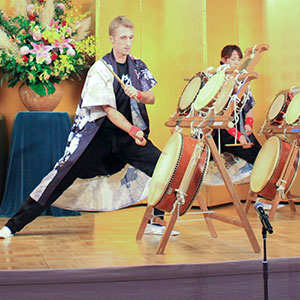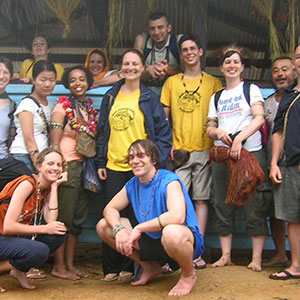Coming full circle: championing globalisation then and now
Now in its 27th year, the Japan Exchange and Teaching (JET) Programme has welcomed over 55,000 people from 62 countries to deliver grassroots international exchange between Japan and other nations. Fourth in our series, this column features former JETs, both in the UK and Japan, who keep the idea of fostering mutual understanding firmly at heart.
As British consul-general, my job is to promote UK interests in western Japan, covering 29 prefectures, from Toyama and Aichi in the western part of Honshu island to the islands of Shikoku, Kyushu and Okinawa in the south.
This work includes encouraging western Japan investment in the UK, and increasing the number of British firms successfully doing business in the area.
I champion UK values, culture, arts and education, as well as engage with the local science and innovation community to promote prosperity and growth for both our countries. I follow local social and political developments that might have an impact on UK interests.
I also support about 4,500 British nationals living in western Japan, and many of the 170,000 British tourists who come to Japan each year. It was this job that brought me to the Kansai region.
But I had known I would return here at some point, after my incredibly exciting experiences as a 20-year-old student at Kansai Gaidai University in Osaka.
In those days I had strolled around the futuristic neon sights of Dotonburi in Osaka; hiked up Mount Rokko in Hyogo Prefecture; and enjoyed atmospheric Gion, Kyoto’s most famous geisha district.
And 23 years on, in my role as British consul-general, I find that these places remain just as exciting. It is a privilege to be representing the UK in a city, region and country for which I have huge affection.
Kansai International Airport didn’t exist when I landed in Osaka in 1991. Now, I am working with UK firms to see if British expertise can help with the airport’s planned privatisation.
I worked in Hilton Osaka’s café as a waiter in 1991; in October I will be launching their first British food fair. Ippudo, a popular ramen eatery I enjoyed as a foreign student, launched their first restaurant in London, and I recently met their chief executive in Hakata to go over those plans.
There is no doubt that my previous experience in Kansai is helping me to further relationships and business opportunities for the UK today.
But, I also owe a lot to the Japan Exchange and Teaching (JET) Programme and what I learnt as a coordinator for international relations in Kochi Prefecture.
I was accepted onto the programme after graduating from the University of Leeds with a BA Honours degree in Japanese and Chinese. I lived for two years in a rural community that had more vending machines and flashing yellow traffic lights than non-Japanese residents.
My objective was to help “internationalise” Sakawa-cho through initially meeting residents. Actually it was more nomunikeshon (communication through drinking) than dialogue.
My activities focused on grass-roots internationalisation, ranging from translation work and developing links between Sawaka-cho and my hometown, to implementing events to foster international exchange, as well as promoting the benefits of internationalisation.
I also provided a different perspective on the work of the town, including urban development and PR.
Working in Japanese local government also gave me a valuable insight into aspects of Japanese politics, including the use of ringi (decision-making via circular letters), the proposing of budgets, and the execution of project management initiatives.
I was fortunate enough to meet people from many firms, to understand a little more of Japanese management practices, and to learn the basics of presenting and negotiating in Japanese.
The Great Hanshin Earthquake occurred during my time on the JET Programme. My role of checking on other JET participants helped shape my early crisis management experiences.
But even so, I never thought that, two decades later, I would be leading teams in and around Sendai City in Miyagi Prefecture as the senior UK representative on the ground following the Great East Japan Earthquake and Tsunami.
In 2011, I had overall responsibility for the evacuation of British nationals affected by the triple disaster, and for ensuring Brits remaining in the area were aware of changes to travel advice and other forms of support.
Today, in order to help UK nationals be prepared for a crisis, the consulate-general and embassy report crisis preparedness activities at www.gov.uk/world/japan and any changes to travel advice at www.gov.uk/foreign-travel-advice/japan.
The economy of the total 29 prefectures within my remit is roughly equivalent to the UK in terms of GDP. There are extensive business and collaboration opportunities between western Japan and the UK for both British and Japanese firms.





